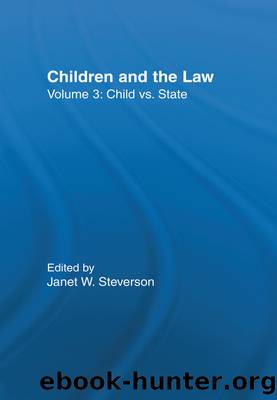Child vs. State by Steverson Janet W.;

Author:Steverson, Janet W.;
Language: eng
Format: epub
ISBN: 1382096
Publisher: Taylor & Francis Group
C. Congressional Proposals to Curtail Minorsâ Reproductive Rights
The Child Custody Protection Act (CCPA) would make it a federal crime for a non-parent to take a pregnant minor across state lines to obtain an abortion in order to avoid laws in her home state requiring the involvement of parents in abortion decisions.252 It has already passed the House of Representatives253 and is expected to be voted upon in the Senate in 1999.254 This new federal offense is punishable by both fines and imprisonment and contains no exemption for relatives, such as grandparents or adult siblings. The law also provides for a civil action on behalf of the minorâs âparent or [legal] guardian who suffers legal harm from a violation of [this statute].â255
The CCPAâs supporters argue that the Act is necessary to prevent older men who have impregnated young girls from taking them across state lines for abortions to hide the evidence of their misdeeds.256 It is quite evident, however, that its true purpose is to deny access to abortion services to young, pregnant women. Since the chances of enacting a ban on all abortions are slim to nonexistent, particularly because it would take a constitutional amendment to do so, abortion opponents have concentrated on smaller measures involving issues which have popular appeal, such as parental rights in their childrenâs upbringing.257
The CCPA raises difficult issues concerning the meaning of our federal system of government and its dual sovereignty. State laws that would seek to interdict their citizens from traveling to other jurisdictions to obtain abortions would raise serious constitutional questions about our âcommitments to national union and national citizenshipâ and arguably would be âbarred by the citizenship clause of the fourteenth amendment, the commerce clause, and the privileges and immunities clause of article IV of the Constitution.â258 If Congress acts, however, there are issues of whether the Privileges and Immunities Clause or the right to travel doctrine limit the actions of Congress.259 The fact that minors are involved may well change the analysis, since minors do not have the same freedom of movement as adults.260 In upholding suspicionless random urinalyses of student athletes, the Court wrote:
Traditionally at common law, and still today, unemancipated minors lack some of the most fundamental rights of self-determinationâincluding even the right of liberty in its narrow sense, i.e., the right to come and go at will. They are subject, even as to their physical freedom, to the control of their parents or guardians.261
Download
This site does not store any files on its server. We only index and link to content provided by other sites. Please contact the content providers to delete copyright contents if any and email us, we'll remove relevant links or contents immediately.
The Thirst by Nesbo Jo(6450)
Permanent Record by Edward Snowden(5549)
The Myth of the Strong Leader by Archie Brown(5249)
Spare by Prince Harry The Duke of Sussex(4804)
A Higher Loyalty: Truth, Lies, and Leadership by James Comey(4565)
Secrecy World by Jake Bernstein(4406)
Adulting by Kelly Williams Brown(4243)
The Borden Murders by Sarah Miller(4031)
Killers of the Flower Moon by David Grann(3761)
Machine Learning at Scale with H2O by Gregory Keys | David Whiting(3660)
Fear by Bob Woodward(3529)
American Kingpin by Nick Bilton(3513)
The Secret Barrister by The Secret Barrister(3430)
Future Crimes by Marc Goodman(3377)
The Last Girl by Nadia Murad(3349)
The House on Mango Street by Sandra Cisneros(3233)
Liar's Poker by Michael Lewis(3231)
The Social Psychology of Inequality by Unknown(2774)
Graduate Admissions Essays, Fourth Edition: Write Your Way into the Graduate School of Your Choice (Graduate Admissions Essays: Write Your Way Into the) by Asher Donald(2743)
